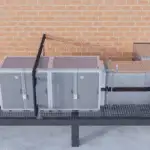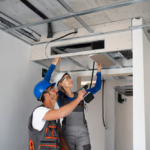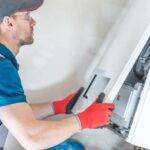Importance of winter HVAC checkup
During the winter, it’s crucial to have your HVAC system checked to ensure it’s working efficiently. Regular maintenance can help prevent unexpected breakdowns and ensure your system runs smoothly throughout the cold season. HVAC professionals recommend scheduling a winter checkup to inspect and clean the system, change filters, and identify any potential issues before they escalate. This proactive approach can save you time and money in the long run and help maintain a comfortable indoor environment during the winter months.

Benefits of regular HVAC maintenance
Regular HVAC maintenance has several benefits, including lower energy costs and improved system efficiency. It can also help prevent costly breakdowns and extend the lifespan of your HVAC system. Additionally, regular maintenance can improve the air quality in your home, ensuring a healthier and more comfortable living environment for you and your family.
Signs of HVAC system issues
Look out for these signs that might indicate issues with your HVAC system:
- Strange Noises: Strange noises such as banging, rattling, or screeching could signal a problem with your HVAC system.
- Inconsistent Heating or Cooling: If some areas of your home feel significantly warmer or cooler than others, your HVAC system might be struggling.
- Increased Energy Bills: A sudden spike in your energy bills without a corresponding increase in usage could indicate that your HVAC system is not running efficiently.
- Unpleasant Odors: If you notice musty or burning smells coming from your vents, it could be a sign of mold or an electrical issue within your HVAC system.
- Frequent Cycling: If your HVAC system is turning on and off more frequently than usual, it might be a sign of an underlying issue that needs attention.
Stay aware of these signs to catch potential HVAC problems early and keep your system running smoothly throughout the winter.
DIY HVAC maintenance tips for winter
To ensure your HVAC system runs smoothly during the winter, you can perform some maintenance tasks yourself. Here are a few tips to help you maintain your HVAC system during the winter months:
- Replace the air filter: A dirty filter can restrict airflow and cause your system to work harder, leading to higher energy bills and potential damage to the system. Make sure to replace the filter regularly to keep your HVAC system running efficiently.
- Clean the outdoor unit: Remove any debris, leaves, or debris from the outdoor unit to ensure proper airflow and prevent the system from overworking.
- Check the thermostat: Make sure your thermostat is working properly and set to a comfortable temperature. Consider installing a programmable thermostat to save on energy costs.
- Check for drafts: Inspect windows and doors for drafts and seal any gaps with weather-stripping or caulking to prevent heat loss.
By performing these simple maintenance tasks, you can help your HVAC system operate efficiently and keep your home comfortable during the winter months.
Professional HVAC checkup services
When it comes to professional HVAC checkup services, it’s important to find a qualified technician to ensure your system is ready for winter. A professional checkup includes a thorough inspection of your heating system, cleaning of components, checking for any potential issues, and ensuring the system is operating efficiently. It’s recommended to schedule a professional HVAC checkup at least once a year, ideally before the winter season begins. Professional services can help identify any issues early on, ensuring your HVAC system is prepared to keep you warm and comfortable during the cold months.
What to expect during a winter HVAC checkup
During a winter HVAC checkup, you can expect the technician to inspect and clean your heating system. They will check for any wear and tear on the components, including the furnace, heat pump, or boiler. The technician will also test the thermostat to ensure accurate temperature control and may replace the air filter if necessary. Additionally, they will inspect the ductwork for any leaks or blockages that could affect the system’s efficiency. Finally, the technician will provide recommendations for any necessary repairs or improvements to ensure your HVAC system is ready to keep you warm throughout the winter.
Key areas checked during a winter HVAC inspection
During a winter HVAC inspection, a professional technician typically checks the thermostat to ensure it’s functioning properly, the heat exchanger for any cracks or damage, the burner combustion for efficient fuel usage, and the safety controls to prevent any hazards. They also inspect the filtration system to ensure clean air circulation and the electrical connections for any loose or damaged wires. These key areas ensure that your HVAC system is in good condition to keep you warm and comfortable during the winter months.
Upgrading your HVAC system for winter efficiency
Upgrading your HVAC system for winter efficiency can help you save on energy costs and improve the comfort of your home. Consider replacing older units with newer, more energy-efficient models, such as a programmable thermostat, high-efficiency furnace, or heat pump. These upgrades can help you optimize your HVAC system’s performance and reduce your energy consumption during the winter months. Additionally, proper insulation and sealing of ductwork can further enhance the efficiency of your HVAC system and ensure even heat distribution throughout your home.
Winter HVAC maintenance checklist
Winter is the best time to check up on your HVAC system. Regular maintenance can help avoid breakdowns in the chilly months. It’s essential to ensure your system is working efficiently and safely. Here are some key items to include in your winter HVAC maintenance checklist:
- Check and replace the air filters
- Inspect and clean the outdoor unit
- Test and tighten electrical connections
- Clean the coils and check refrigerant levels
Conclusion and recap
As we conclude this guide on winter HVAC checkup, it’s essential to recap the key points to remember. Regular maintenance of your HVAC system can improve its efficiency and extend its lifespan. It’s important to clean or replace air filters, check the thermostat, inspect the ductwork for leaks, and ensure proper ventilation around the outdoor unit. Additionally, scheduling a professional inspection before the winter season can help identify and address any potential issues. By following these tips, you can ensure that your HVAC system operates effectively during the colder months, keeping your home comfortable and energy-efficient.




